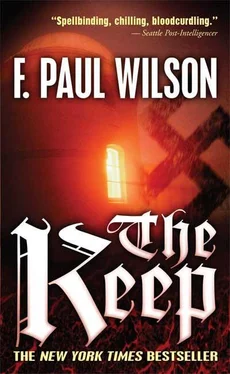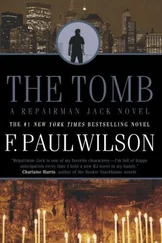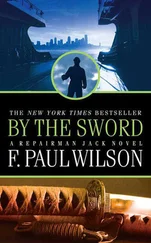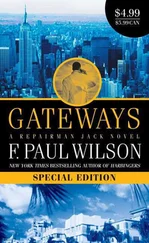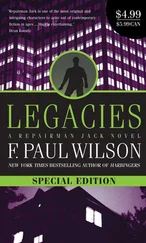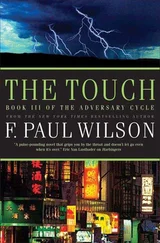F. Paul Wilson - The Keep
Здесь есть возможность читать онлайн «F. Paul Wilson - The Keep» весь текст электронной книги совершенно бесплатно (целиком полную версию без сокращений). В некоторых случаях можно слушать аудио, скачать через торрент в формате fb2 и присутствует краткое содержание. Жанр: Ужасы и Мистика, на английском языке. Описание произведения, (предисловие) а так же отзывы посетителей доступны на портале библиотеки ЛибКат.
- Название:The Keep
- Автор:
- Жанр:
- Год:неизвестен
- ISBN:нет данных
- Рейтинг книги:3 / 5. Голосов: 1
-
Избранное:Добавить в избранное
- Отзывы:
-
Ваша оценка:
- 60
- 1
- 2
- 3
- 4
- 5
The Keep: краткое содержание, описание и аннотация
Предлагаем к чтению аннотацию, описание, краткое содержание или предисловие (зависит от того, что написал сам автор книги «The Keep»). Если вы не нашли необходимую информацию о книге — напишите в комментариях, мы постараемся отыскать её.
The Keep — читать онлайн бесплатно полную книгу (весь текст) целиком
Ниже представлен текст книги, разбитый по страницам. Система сохранения места последней прочитанной страницы, позволяет с удобством читать онлайн бесплатно книгу «The Keep», без необходимости каждый раз заново искать на чём Вы остановились. Поставьте закладку, и сможете в любой момент перейти на страницу, на которой закончили чтение.
Интервал:
Закладка:
"Identify yourself!"
The fumbling at the latch stopped, to be replaced by a faint creaking and cracking, as if some huge weight were leaning against the door, trying to get through it. Kaempffer couldn't be sure in the dark, but he thought he saw the door bulge inward. That was two-inch oak! It would take massive weight to do that! As the creaking of the wood grew louder, he found himself trembling and sweating. There was nowhere to go. And now there was another sound, as if something were clawing at the door to get in. The noises assailed him, growing louder, paralyzing him. The wood was cracking so that it seemed it must break into a thousand fragments; the hinges cried out as their metal fastenings were tortured from the stone. Something had to give! He knew he should be chambering a shell into his Luger but he could not move.
The latch suddenly screeched and gave way, the door bursting open and slamming against the wall. Two figures stood outlined in the light from the hall. By their helmets, Kaempffer knew them to be German soldiers, and by their jackboots he knew them to be two of the einsatzkommandos he had brought with him. He should have relaxed at the sight of them, but for some reason he did not. What were they doing breaking into his room?
"Who is it?" he demanded.
They made no reply. Instead, they stepped forward in unison toward where he lay frozen in his bedroll. There was something wrong with their gait—not a gross disorder, but a subtle grotesquery. For one disconcerting moment, Major Kaempffer thought the two soldiers would march right over him. But they stopped at the edge of his bed, simultaneously, as if on command. Neither said a word. Nor did they salute.
"What do you want?" He should have been furious, but the anger did not come. Only fear. Against his wishes, his body was shrinking into the bedroll, trying to hide.
"Speak to me!" It was a plea.
No reply. He reached down with his left hand and found the battery lamp on the floor beside his bed, all the while keeping the Luger in his right trained on the silent pair looming over him. When his questing fingers found the toggle switch, he hesitated, listening to his own rasping respirations. He had to see who they were and what they wanted, but a deep part of him warned against turning on the light.
Finally, he could stand it no longer. With a groan, he flicked the toggle and held the lamp up.
Privates Flick and Waltz stood over him, faces white and contorted, eyes glazed. A gaping crescent of torn and bloodied flesh grinned down at him from the place where each man's throat had been. No one moved ... the two dead soldiers wouldn't, Kaempffer couldn't. For a long, heart-stopping moment, Kaempffer lay paralyzed, the lamp held aloft in his hand, his mouth working spasmodically around a scream of fear that could not pass his locked throat.
Then there was motion. Silently, almost gracefully, the two soldiers leaned forward and fell onto their commanding officer, pinning him in his bedroll under hundreds of pounds of limp dead flesh.
As Kaempffer struggled frantically to pull himself out from under the two corpses, he heard a far-off voice begin to wail in mortal panic. An isolated part of his brain focused on the sound until he had identified it.
The voice was his own.
"Now do you believe?"
"Believe what?" Kaempffer refused to look up at Woermann. Instead, he concentrated on the glass of kummel pressed between both palms. He had downed the first half in one gulp and now sipped steadily at the rest. By slow, painful degrees he was beginning to feel that he had himself under control again. It helped that he was in Woermann's quarters and not his own.
"That SS methods will not solve this problem."
"SS methods always work."
"Not this time."
"I've only begun! No villagers have died yet!"
Even as he spoke, Kaempffer admitted to himself that he had run up against a situation completely beyond the experience of anyone in the SS. There were no precedents, no one he could turn to for advice. There was something in the keep beyond fear, beyond coercion. Something magnificently adept at using fear as its own weapon. This was no guerrilla group, no fanatic arm of the National Peasant Party. This was something beyond war, beyond nationality, beyond race.
Yet the village prisoners would have to die at dawn. He could not let them go—to do so would be to admit defeat, and he and the SS would lose face. He must never allow that to happen. It made no difference that their deaths would have no effect on the ... thing that was killing the men. They had to die.
"And they won't die," Woermann said.
"What?" Kaempffer finally looked up from the glass of kummel.
"The villagers—I let them go."
"How dare you!" Anger—he began to feel alive again. He rose from his chair.
"You'll thank me later on when you don't have the systematic murder of an entire Romanian village to explain. And that's what it would come to. I know your kind. Once started on a course, no matter how futile, no matter how many you hurt, you keep going rather than admit you've made a mistake. So I'm keeping you from getting started. Now you can blame your failure on me. I will accept the blame and we can all find a safer place to quarter ourselves."
Kaempffer sat down again, mentally conceding that Woermann's move had given him an out. But he was trapped. He could not report failure back to the SS. That would mean the end of his career.
"I'm not giving up," he told Woermann, trying to appear stubbornly courageous.
"What else can you do? You can't fight this!"
"I will fight it!"
"How?" Woermann leaned back and folded his hands over his small paunch. "You don't even know what you're fighting, so how can you fight it?"
"With guns! With fire! With—" Kaempffer shrank away as Woermann leaned toward him, cursing himself for cringing, but helpless against the reflex.
"Listen to me, Herr Sturmbannführer: Those men were dead when they walked into your room tonight. Dead! We found their blood in the rear corridor. They died in your makeshift prison. Yet they walked off the corridor, up to your room, broke through the door, marched up to your bed, and fell on you. How are you going to fight something like that?"
Kaempffer shuddered at the memory. "They didn't die until they got to my room! Out of loyalty they came to report to me despite their mortal wounds!" He didn't believe a word of it. The explanation came automatically.
"They were dead, my friend," Woermann said without the slightest trace of friendship in his tone. "You didn't examine their bodies—you were too busy cleaning the crap out of your pants. But I did. I examined them just as I have examined every man who has died in this godforsaken keep. And believe me, those two died on the spot. All the major blood vessels in their necks were torn through. So were their windpipes. Even if you were Himmler himself, they couldn't have reported to you."
"Then they were carried!" Despite what he had seen with his own eyes he pressed for another explanation. The dead didn't walk. They couldn't!
Woermann leaned back and stared at him with such disdain that Kaempffer felt small and naked.
"Do they also teach you to lie to yourself in the SS?"
Kaempffer made no reply. He needed no physical examination of the corpses to know that they had been dead when they had walked into his room. He had known that the instant the light from his lamp had shone on their faces.
Woermann rose and strode toward the door. "I'll tell the men we leave at first light."
"NO!" The word passed his lips louder and shriller than he wished.
"You don't really intend to stay here, do you?" Woermann asked, his expression incredulous.
Читать дальшеИнтервал:
Закладка:
Похожие книги на «The Keep»
Представляем Вашему вниманию похожие книги на «The Keep» списком для выбора. Мы отобрали схожую по названию и смыслу литературу в надежде предоставить читателям больше вариантов отыскать новые, интересные, ещё непрочитанные произведения.
Обсуждение, отзывы о книге «The Keep» и просто собственные мнения читателей. Оставьте ваши комментарии, напишите, что Вы думаете о произведении, его смысле или главных героях. Укажите что конкретно понравилось, а что нет, и почему Вы так считаете.
